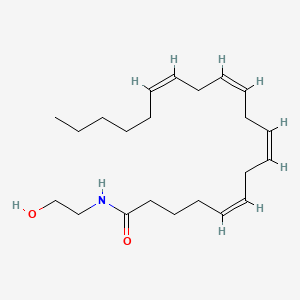| MeSH term | MeSH ID | Detail |
|---|---|---|
| Overweight | D050177 | 11 associated lipids |
| Headache Disorders, Secondary | D051271 | 1 associated lipids |
| Orthostatic Intolerance | D054971 | 1 associated lipids |
| Vascular System Injuries | D057772 | 2 associated lipids |
| Acute Pain | D059787 | 3 associated lipids |
Anandamide
Anandamide is a lipid of Fatty Acyls (FA) class. Anandamide is associated with abnormalities such as Dehydration. The involved functions are known as Process, Phenomenon, Phosphorylation, Catabolic Process and Gene Expression. Anandamide often locates in Nuchal region, Microglial and Hepatic. The associated genes with Anandamide are SGPL1 gene, SPTLC1 gene, RPSA gene, KDSR gene and SMPD1 gene. The related lipids are Sphingolipids, Lipopolysaccharides, Lysophospholipids, LYSO-PC and lysophosphatidylethanolamine.
Cross Reference
Introduction
To understand associated biological information of Anandamide, we collected biological information of abnormalities, associated pathways, cellular/molecular locations, biological functions, related genes/proteins, lipids and common seen animal/experimental models with organized paragraphs from literatures.
What diseases are associated with Anandamide?
Anandamide is suspected in Dehydration and other diseases in descending order of the highest number of associated sentences.
Related references are mostly published in these journals:
| Disease | Cross reference | Weighted score | Related literature |
|---|
Possible diseases from mapped MeSH terms on references
We collected disease MeSH terms mapped to the references associated with Anandamide
PubChem Associated disorders and diseases
What pathways are associated with Anandamide
There are no associated biomedical information in the current reference collection.
PubChem Biomolecular Interactions and Pathways
Link to PubChem Biomolecular Interactions and PathwaysWhat cellular locations are associated with Anandamide?
Visualization in cellular structure
Associated locations are in red color. Not associated locations are in black.
Related references are published most in these journals:
| Location | Cross reference | Weighted score | Related literatures |
|---|
What functions are associated with Anandamide?
Related references are published most in these journals:
| Function | Cross reference | Weighted score | Related literatures |
|---|
What lipids are associated with Anandamide?
Related references are published most in these journals:
| Lipid concept | Cross reference | Weighted score | Related literatures |
|---|
What genes are associated with Anandamide?
Related references are published most in these journals:
| Gene | Cross reference | Weighted score | Related literatures |
|---|
What common seen animal models are associated with Anandamide?
There are no associated biomedical information in the current reference collection.
NCBI Entrez Crosslinks
All references with Anandamide
Download all related citations| Authors | Title | Published | Journal | PubMed Link |
|---|---|---|---|---|
| Deutsch DG and Makriyannis A | Inhibitors of anandamide breakdown. | 1997 | NIDA Res. Monogr. | pmid:9260184 |
| Burkey RT and Nation JR | (R)-methanandamide, but not anandamide, substitutes for delta 9-THC in a drug-discrimination procedure. | 1997 | Exp Clin Psychopharmacol | pmid:9260067 |
| Fernández-Ruiz JJ et al. | Time course of the effects of different cannabimimetics on prolactin and gonadotrophin secretion: evidence for the presence of CB1 receptors in hypothalamic structures and their involvement in the effects of cannabimimetics. | 1997 | Biochem. Pharmacol. | pmid:9256167 |
| Berdyshev EV et al. | Influence of fatty acid ethanolamides and delta9-tetrahydrocannabinol on cytokine and arachidonate release by mononuclear cells. | 1997 | Eur. J. Pharmacol. | pmid:9253958 |
| Matsuda S et al. | Metabolism of anandamide, an endogenous cannabinoid receptor ligand, in porcine ocular tissues. | 1997 | Exp. Eye Res. | pmid:9245900 |
| Twitchell W et al. | Cannabinoids inhibit N- and P/Q-type calcium channels in cultured rat hippocampal neurons. | 1997 | J. Neurophysiol. | pmid:9242259 |
| Hansen HS et al. | Characterization of glutamate-induced formation of N-acylphosphatidylethanolamine and N-acylethanolamine in cultured neocortical neurons. | 1997 | J. Neurochem. | pmid:9231736 |
| Hillard CJ et al. | Accumulation of N-arachidonoylethanolamine (anandamide) into cerebellar granule cells occurs via facilitated diffusion. | 1997 | J. Neurochem. | pmid:9231721 |
| Willoughby KA et al. | The biodisposition and metabolism of anandamide in mice. | 1997 | J. Pharmacol. Exp. Ther. | pmid:9223560 |
| Molina-Holgado F et al. | Anandamide suppresses nitric oxide and TNF-alpha responses to Theiler's virus or endotoxin in astrocytes. | 1997 | Neuroreport | pmid:9223079 |
| Wenger T et al. | Effects of anandamide on gestation in pregnant rats. | 1997 | Life Sci. | pmid:9199480 |
| Lake KD et al. | Cannabinoid-induced hypotension and bradycardia in rats mediated by CB1-like cannabinoid receptors. | 1997 | J. Pharmacol. Exp. Ther. | pmid:9190833 |
| Welch SP | Characterization of anandamide-induced tolerance: comparison to delta 9-THC-induced interactions with dynorphinergic systems. | 1997 | Drug Alcohol Depend | pmid:9179505 |
| Bisogno T et al. | Occurrence and metabolism of anandamide and related acyl-ethanolamides in ovaries of the sea urchin Paracentrotus lividus. | 1997 | Biochim. Biophys. Acta | pmid:9150253 |
| Lake KD et al. | Cardiovascular effects of anandamide in anesthetized and conscious normotensive and hypertensive rats. | 1997 | Hypertension | pmid:9149688 |
| Bloom AS et al. | Nonclassical and endogenous cannabinoids: effects on the ordering of brain membranes. | 1997 | Neurochem. Res. | pmid:9131634 |
| Hunter SA and Burstein SH | Receptor mediation in cannabinoid stimulated arachidonic acid mobilization and anandamide synthesis. | 1997 | Life Sci. | pmid:9126878 |
| Mechoulam R | Todd's achievement. | 1997 | Nature | pmid:9126725 |
| Stefano GB et al. | Identification and characterization of the leech CNS cannabinoid receptor: coupling to nitric oxide release. | 1997 | Brain Res. | pmid:9125406 |
| Schmid PC et al. | Changes in anandamide levels in mouse uterus are associated with uterine receptivity for embryo implantation. | 1997 | Proc. Natl. Acad. Sci. U.S.A. | pmid:9108127 |
